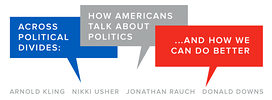First, a response to Jonathan Rauch’s compliment about my use of the term “emotional correctness.” Alas, Jonathan, I first encountered the term reading Frank Furedi’s book What’s Happened to the University?, so I cannot claim originality here. I can say that I immediately adopted the term for my own use because it so poignantly captured my longstanding concern about the trend the term captures. Other insightful writers have chronicled the ways in which the “therapeutic ethic” has affected public discourse and citizenship, going back to Philip Rieff (1966), Richard Sennett (1974), Christopher Lasch (1976), Elizabeth Lasch-Quinn (2001), and even Hannah Arendt in the 1950s. This is not a knock on therapy’s utility within its proper sphere, but rather a critique of its expansion into other domains of the polity, where it can be counterproductive or worse. Among other things, this aggrandizement reflects the blurring of the boundary between public and private life that once served as a linchpin of liberal freedom. Social media has exacerbated this blurring its own special way.
I first witnessed the contemporary deployment of emotional correctness back in 2000, when a UW-Madison student responded to a talk by Dinesh D’Souza during the question and answer session by declaring that D’Souza’s talk had traumatized him so much that he wouldn’t be able to study for at least a week, or even perform his normal functions. The audience was rather stunned by this remark, but I perceived it as a harbinger of things to come. I wish that my cultural antenna had been wrong.
Second, this trend adds some weight to the pessimism that Arnold Kling expresses in his reply to Jonathan regarding social media’s ability to fix itself. Fact checking and checking for harmful vitriol in this domain become more difficult when a culture’s consensus over what constitutes “harm” breaks down.[1] The concept of “harm” continues to expand, as Nadine Strossen shows regarding hate speech in her recent book, Hate: Why We Should Resist It with Free Speech, Not Censorship. In iGen: Why Today’s Super-Connected Kids Are Growing Up Less Rebellious, More Tolerant, Less Happy—and Completely Unprepared for Adulthood—and What That Means for the Rest of Us, social psychologist Jean Twenge found that 28% of a national survey of young adults believed a professor should be fired for making just one “insensitive” remark in class.
Given what we could call the “new politics of harm,” how can we fairly trust social media organizations so replete with young adults to consistently distinguish in a proper manner?
Are social media institutions properly equipped to understand this problem, and then to monitor appropriately?
Note
[1] See Bernard E. Harcourt, “The Collapse of the Harm Principle,” Journal of Criminal Law and Criminology, Volume 90 (1990).

